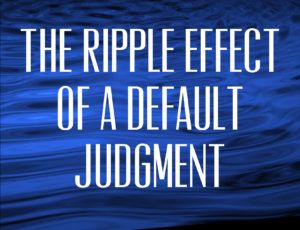By: Robert J. Nahoum
Debt collection lawyers’ bread and butter are default judgments because they are the quickest and easiest way to hang up consumers for old debts.  The fastest way to a default judgment is when the consumer fails answer the complaint. If you are unaware that you have been sued, the debt collector can have a default judgment entered in less than 60 days. For this reason, it is no surprise that between sixty and ninety-five percent of all consumer debt collection lawsuits are estimated to result in default judgments.
The ripple effects of a default judgment cannot be overstated – bounced checks, stress, damaged credit scores, and roadblocks to employment and housing are all potential consequences. New York laws make judgment enforcement easy for the debt collector and provide a number of enforcement devices at their disposal. In fact, many of the most powerful of these devices don’t even require the debt collector to go before a judge including:
- Freezing (restraining) a bank account;
- Wage garnishment;
- Auctioning your personal property; and
- Subpoenaing your friends, family and co-workers;
So what do you do if you discover that a default judgment has been entered against you? Fortunately, New York courts have recognized that default judgments are highly questionable particularly due to the pervasiveness of sewer service. For this reason, it is pretty easy to have the default judgment reversed or “vacated†as it is called in the law. To do so, you go to the courthouse and file an “order to show cause†along with a sworn affidavit from you (the court clerks have forms). Your affidavit must swear to two points, (1) that you have a reasonable excuse for your default (like you were never served with the papers); and (2) that you have a defense to the case (like you don’t owe all or part of the debt or that you have never heard of the plaintiff). You deliver the papers to the attorney for the debt collector and show up in court on the designated day where more times than not, your order to show cause will be granted and the default judgment will be vacated.
Beware, after the default judgment is vacated, that debt collector is still going to try and collect that debt or reach a settlement. Hiring a qualified and competent New York attorney can help to make certain that you get the best deal possible and that the debt collector is not taking advantage of you.
If you need help settling or defending a debt collection lawsuit, stopping harassing debt collectors or suing a debt collector, contact us today to see what we can do for you.
The Law Offices of Robert J. Nahoum, P.C
(845) 232-0202
www.nahoumlaw.com

